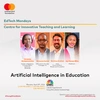At this year’s Mobile World Congress, held from February 26 to 29 in Barcelona, Spain, 41 sessions focusing on artificial intelligence (AI) were held. Drawing over 90,000 attendees, this global event helped many take a deep dive into AI and the growing interest in its impact and potential to change lives.
Around the world, AI is seen as a game-changer for how businesses run their operations, offering endless possibilities for practical use. According to global consultancy firm PricewaterhouseCoopers (PwC), “AI could contribute up to $15.7 trillion to the global economy in 2030, more than the current output of China and India combined.”
In another report, Sizing the Prize, PwC additionally states that, “As humans and machines collaborate more closely, and AI innovations come out of the research lab and into the mainstream, the transformational possibilities are staggering.”
Among the sectors that will derive such “transformational possibilities” from this growing form of technology is education, where AI has the potential to help educators analyse data quickly and efficiently, thus leapfrogging manual processes to internet-based learning.
According to the 2023 Global Markets Insights report, AI in the education market reached $4 billion in 2022 and is projected to grow by more than a 10 percent compound annual growth rate from 2023 to 2032, “owing to the growing inclination towards personalized learning.” According to the report, the adoption of AI in the education market is growing. It can play a key role in “comprehensive data collection and analysis for offering valuable insights to educators, administrators and policymakers.”
With such growing attention toward AI, the April 2024 edition of the Mastercard Foundation’s EdTech Mondays delved deeper into the role of AI in education within the African continent’s education system framework.
Artificial Intelligence in Education: Watch the full episode of EdTech Mondays here:
“AI is transforming the global economy and will have a major impact in education. For example, we can teach machines how to mark exams while teachers take on higher roles,” says Mutembei Kariuki, Founder and Chief Executive Officer at Fastagger. “We are teaching machines to think and do things that humans do. Leaving AI to handle routine matters will then elevate teachers to where they are supposed to be, as mentors to the learners.”
Kariuki’s views are in line with the potential role AI can play in education but whose full impact is yet to be felt, especially in developing countries. Like any innovation, AI presents opportunities but also challenges. While it can teach students new things with individualized perspectives, it can also pose a challenge for educators and policymakers as a significant mindset shift is needed to incorporate this new reality.
“AI is coming and is very disruptive as people grapple with what it can do,” says Matthew Grollnek, Future of Work Lead at the Mastercard Foundation. “People are grappling with what it can do, while few know the answers. Some people think it is scary and that we will not be able to contain it. It will present a big shift as education moves to a new system replacing one that has been there for over 100 years. The question is how to maximize the benefits and address the risks.”
For many African countries, the full realization of AI’s potential benefits is however impeded by the absence of a coherent policy framework. As is the case in many areas of development, technological practices often move ahead of policy, and in certain instances, have caused governments to play catch up.
This could, however change as the African Union moves to formalize AI deployment in Africa through the Continental Strategy on AI, which has prioritized education and preservation of African languages as key sectors to benefit from this kind of technology.
Additionally, the African Union Digital Education Strategy and Implementation Plan, covering the 2023-2028 timeframe, has established a framework for engagement and acceleration of digital technologies to align with Africa’s digital education. The use of technology, including artificial intelligence (AI), will enhance digital literacy and skills for everyone, particularly for educators and students, in the areas of teaching, learning, research, assessment, and administration, as well as improve the ability of AU member states to provide the necessary infrastructure for digital education.
Various African countries have already begun to adopt and integrate AI into their policies. Rwanda, for example, is the first African country to have an AI policy that acts as a roadmap to harness the benefits of AI and mitigate its associated risks, especially those associated with sharing children’s data.
“AI is ready for some subjects including coding and some mathematical equations. This will reduce the workload for teachers, especially those trained on how to use it responsibly. It will also bring inclusion and equity to learners with various impairments since Africa lacks enough schools for children with special needs,” says Christine Niyizamwiyitira, Scholar in Residence at Carnegie Mellon University.
AI could also support teachers by improving their ability to curate learning experiences and holistically supporting a learner’s growth and emotional well-being in the classroom.
According to the Mastercard Foundation’s Young Africa Works strategy, by 2030, Africa’s workforce will reach a billion people, with 375 million young people entering the job market. This will require a shift in education strategies, and AI has the potential to equip young Africans with new skill sets needed in the job market.




